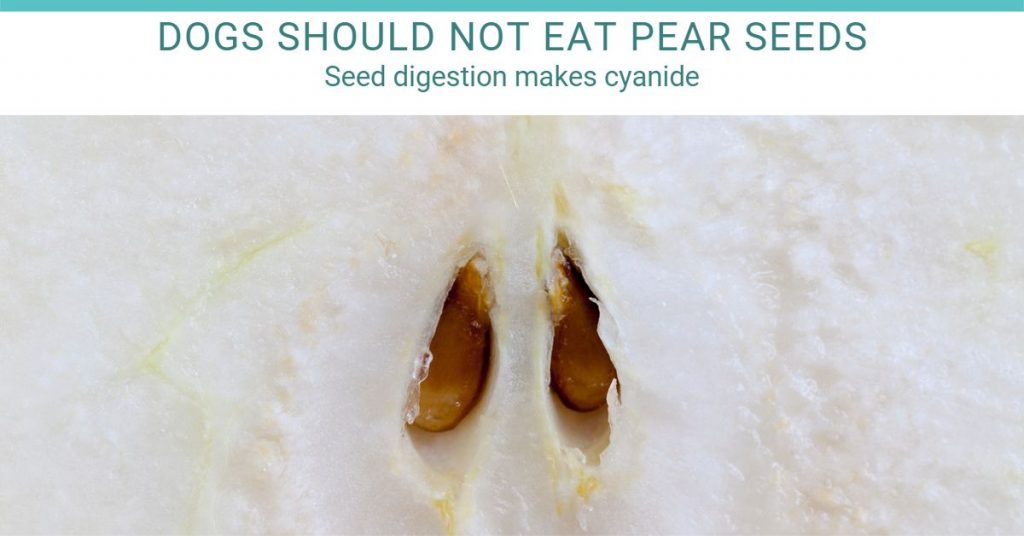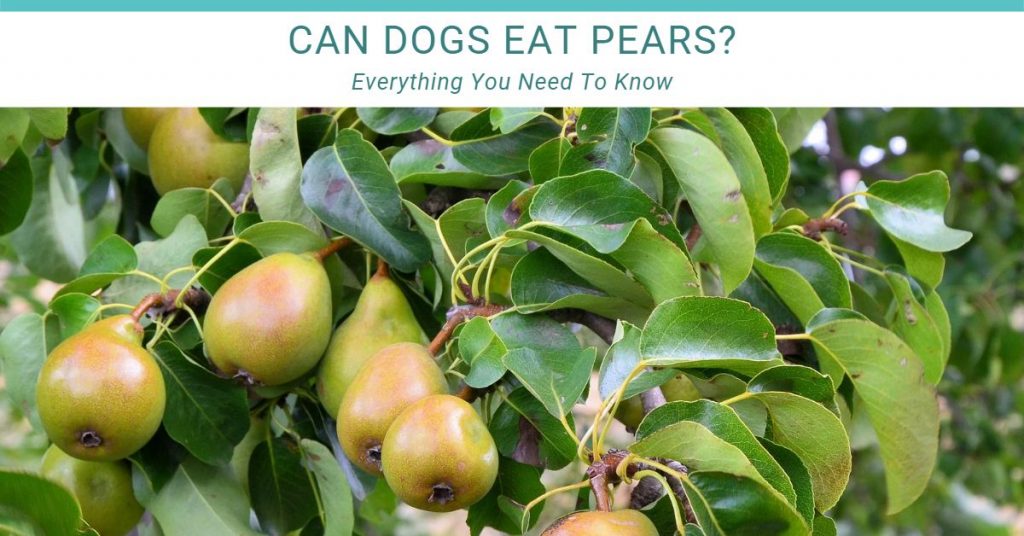Can Dogs Eat Pears?
Pears are typically a fall fruit here in the USA. There are only a few main varieties that are sold in grocery stores. Locally we can get Bosch, Anjo, Barlett, and Red pears. They make delicious additions to a garden salad and are even good when eaten alone. If you have ever sliced a pear up with your dog standing nearby, I am sure your furry friend tried to beg for a piece.
Can Dogs Eat Pears?
Yes dogs can eat pears safely. The skins and flesh are entirely harmless to them, in fact, they are beneficial for them. The exception is the seeds. They have the same issue that is found with apple and orange seeds. More on that later. So if you feed your dog pears, it is best to remove the seeds. You may also want to skin them if they are not organic. This can help reduce exposure to pesticide residue.

The Nutritional Benefits of Pears for Dogs
If you’re looking to offer your dog a tasty and nutritious treat, pears might just be the answer. These sweet and juicy fruits offer a range of potential benefits for your dog’s health. Here’s a closer look at the nutritional goodness that pears can provide to your dog:
- Fiber: Pears are rich in dietary fiber, which can have a positive impact on your dog’s digestion. Fiber promotes regular bowel movements and can help prevent constipation. This is particularly beneficial for dogs prone to gastrointestinal issues.
- Vitamins: Pears contain essential vitamins such as vitamin C and vitamin K. Vitamin C supports your dog’s immune system, aiding in wound healing and overall health. Vitamin K contributes to proper blood clotting and bone health.
- Antioxidants: Pears contain antioxidants, including quercetin and flavonoids. These antioxidants help protect cells from oxidative stress and inflammation, potentially benefiting your dog’s overall well-being.
- Hydration: With a high water content, pears can contribute to your dog’s hydration. This is especially advantageous during warmer months or after physical activities. Be aware that pears do not replace the dog’s need to have access to fresh clean water.
- Low in Calories: Pears are relatively low in calories, making them a great option for dogs that need to watch their weight. They can be a satisfying and flavorful treat without the risk of excessive calorie intake.
- Natural Sugars: Pears contain natural sugars that provide a source of energy. While you should still offer them in moderation, these sugars are generally less concerning than added sugars found in many processed dog treats.
Feeding Pears to Your Dog: Guidelines
While pears offer several nutritional benefits, it’s important to introduce them to your dog’s diet gradually and with care. If you feed your dog too many at once, you may end up creating some unwanted GI issues. Here are some guidelines to keep in mind:
- Preparation: Wash and peel the pear to remove any pesticides or potential allergens. Remove the seeds and core, as they can be tough to digest and pose a choking hazard. If possible, you may want to consider buying organic or locally grown from farmers that do not use pesticides.
- Moderation: Like any treat, moderation is key. Offer small slices or chunks as an occasional treat rather than a regular part of their diet. This helps prevent any potential digestive upset. Remember to core the pears to remove the seeds!
- Observation: After your dog tries pears for the first time, monitor their reaction. Pay attention to any signs of allergies or digestive issues, such as itching, diarrhea, or vomiting. If your dog is allergic you may also observe swelling of the face and head.
- Consult Your Veterinarian: Before introducing new foods to your dog’s diet, including pears, it’s always a good idea to consult your veterinarian. They can provide guidance based on your dog’s specific health needs. If your dog has known allergies to other fruits, it may be best to avoid pears as well.
Incorporating pears into your dog’s diet can be a flavorful and nutritious way to show your love. Just remember to offer them in moderation and alongside a well-balanced dog food to ensure your furry friend receives all the nutrients they need for a healthy and happy life.
Can pears be toxic to dogs?
The only part of the pear that can be toxic is the seeds. To become toxic, the dog has to crush the seeds so the insides are exposed before swallowing them. Exposing the inner part of the seed places amygdalin directly in the dog’s digestive tract. This toxic substance turns into hydrogen cyanide when it comes in contact with the dog’s digestive enzymes. The good news is there is very little of the toxin in pear seeds. The dog would have to eat a lot to have any major issues with the toxins.
can diabetic dogs eat pears?
Pears are naturally high in sugar. However, they are safe for diabetic dogs in moderation. They are about 9% sugar by weight. As a result, they should not be fed in large quantities to diabetic dogs. In reality, they should not be fed in large amounts to any dog. Adding sugars from fruits is not really necessary for dogs to develop or maintain a healthy life. If you follow the Barf diet as I do, dogs only need 2% of their daily caloric intake to be fruit. That does not really amount to very much per day.
Getting back to the diabetic dog, pears are ok for them in small amounts. Pears have a glycemic index of about 38 which means they only mildly can affect blood sugar levels. Again the key is portion control for a dog with restricted diet requirements. Asian pears are even lower on the index, they fall right around 25. They may be a better choice for a diabetic dog.
can dogs eat canned pears?
No, dogs should not eat canned pears. If the dog happens to grab some from your plate it most likely will not harm them. However, they should not be part of their regular diet. They are very high in sugar, which dogs do not need to consume.
Canned pears might seem like a convenient option, but before sharing them with your dog, it’s important to consider a few factors. While dogs can consume certain types of pears, canned pears come with some considerations you should keep in mind:
1. Added Ingredients: Canned pears often come packed in syrup or juice, which can contain added sugars and preservatives. These additives might not be suitable for your dog’s digestive system and can contribute to weight gain or other health issues.
2. Sugar Content: The sugars present in canned pears’ syrup can be a concern. Dogs don’t require added sugars in their diet, and excessive sugar intake can lead to obesity, dental problems, and potentially upset stomachs.
3. Portion Control: If you decide to share canned pears with your dog, ensure that you remove them from the syrup and cut them into bite-sized, seedless pieces. Offering a small amount as an occasional treat is key to prevent overconsumption.
4. Natural vs. Artificial: Opt for canned pears that are packed in natural juice with no added sugars or artificial sweeteners. Natural juice is a healthier alternative, but it’s still important to offer these treats in moderation.
5. Allergies and Digestive Sensitivity: Just like with fresh pears, monitor your dog’s reaction after trying canned pears for the first time. Some dogs may have allergies or sensitivities to certain fruits, including pears.
Can dogs eat unripe pears?
Can dogs eat cactus pears?
Besides the calcium oxalate issue, the cactus pear is also covered in tiny hair sizes thorns called glochids. These can cause extreme irritation to the dog’s mouth, tongue, eyes, or anywhere else it touches. For this fruit, the juice isn’t worth the squeeze. Avoid it!
Can dogs eat Asian pears?
Can my dog eat a whole pear?
Do dogs like pears?
Summary: Can Dogs Eat Pears?
- Dogs can eat pears raw, cooked, ripe, or unripe.
- Dogs should not eat cactus pears
- Dogs should not eat the pear seeds, they are toxic when digested
- Other healthy fruits to try – Cranberries, Mango, Oranges, Watermelon, Pineapple
- Please visit Candogseat.co for more recent posts.



